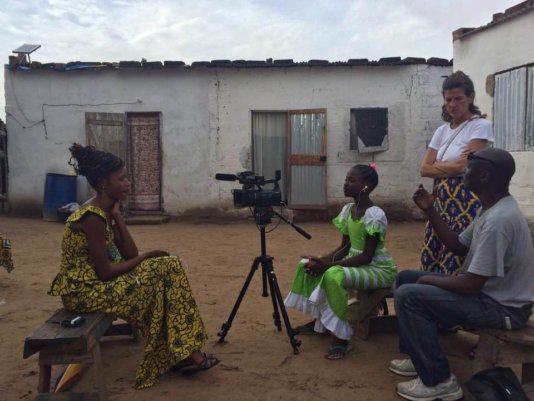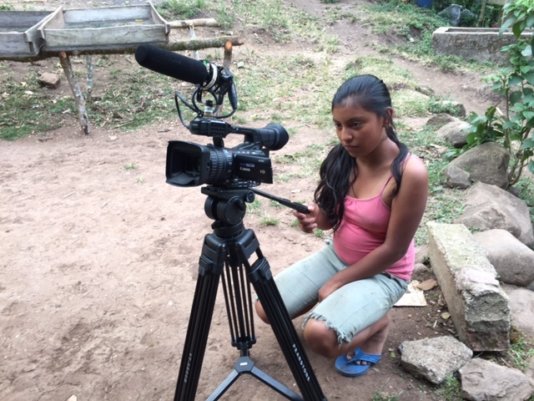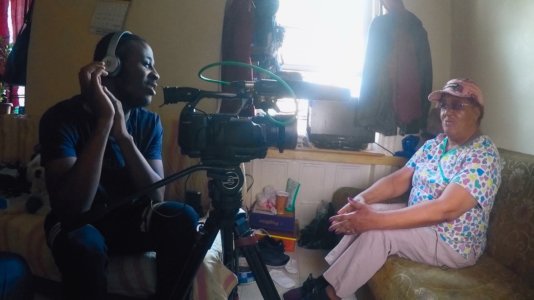- About
- Topics
- Picks
- Audio
- Story
- In-Depth
- Opinion
- News
- Donate
-
Signup for our newsletterOur Editors' Best Picks.Send
Read, Debate: Engage.
| March 25, 2019 | |
|---|---|
| topic: | Child rights |
| tags: | #BYkids, #USA, #human rights |
| located: | USA, Germany |
| by: | Yair Oded |
BYkids – a nonprofit organisation that connects professional filmmakers with teens and children from across the world in a mission to create a new kind of reporting – has recently launched its second season in collaboration with WNET.
This latest season follows the stories of four kids grappling with a diverse range of issues. Mohammad, a 17-year-old Syrian refugee chronicling his new life in Berlin, Germany. Mike, a teenager from Harlem who describes his journey upon his incarceration in the infamous Rikers Island prison. Edelsin, a girl in Nicaragua whose community’s coffee production business is threatened by climate change. And Ndèye Fatou, a Senegalese girl who shows how her village was affected by the elimination of child marriage and Female Genital Cutting (FGC).
Founded in 2007 by executive director Holly Carter, the organisation sets out to remedy how American journalists capture and handle international stories while changing the manner in which Americans engage with global affairs. Carter, at the time a print journalist for The New York Times, was disturbed by what she describes as the insensitivity of journalists travelling to foreign countries with little to no understanding of the local culture and "taking stories". "That struck me as a little dangerous, if we’re trying to be a democratic and informed citizenry, to have a superficial notion of what any of these stories were”, said Carter in an interview for FairPlanet. Carter was further troubled by how minimal her own kids’ exposure to global issues in school, and by the character and scope of community service abroad, which according to her consisted more of leisurely trips than actual engagement with local communities. "There was something about it that felt not only patronising – but colonial", she adds.
It was then that Carter thought of a way in which the flawed culture of American reporting could potentially be fixed. "It occurred to me that kids are very authentic reporters, because their ego or politics either don’t get in the way or don’t exist [...] and I thought how cool would it be to give kids a mentor and a film camera and let them tell their own story as a way into some of these big issues.”
Carter gave FairPlanet a sneak-peek into the production process of BYkids; documentaries. “We, as the board, sit in a conference room in New York and come up with a globally relevant topic, like climate change. We want to do it in a country that isn’t typically in the news.” Once a topic and country are chosen, BYkids contact a nonprofit in that country, which helps them pick the kid filmmaker. Then, a mentor is chosen from BYkids’ ever-growing pool of dedicated professional filmmakers. The mentor subsequently travels abroad to develop the story with the kid, mentoring them through the transformation of the personal story into a coherent and compelling narrative. "The kid is the director, cinematographer and narrator and oversees the editing, writes a script that weaves the whole thing together, and records their narration. Then we got a fabulous twenty-something-minute film to deliver to public television."
According to BYkids, each of their films reaches roughly 248 million viewers in total worldwide. In addition to the 84 million households that are exposed to BYkids’ films through public television in the U.S., students and educators from across the globe access the documentaries and toolkits specifically designed to generate a conversation around the issues they represent in classrooms and workshops. BYkids’ two primary educational partnerships include one with Discovery Education, which distributes each film and school guide to 35 million students and one million teachers, and one with PenPal Schools, which connects their films with 350,000 students through screenings and conversations in 150 countries and all 50 states.
"The thing that’s important for us is going beyond the notion that we’re just a film library, but that we’re an educational movement", Carter told FairPlanet. Adding that their goal is to use "these short personal documentary films to enlighten American students about global issues and give them an opportunity to flex their empathy muscles."
Each of the documentary films provides an intimate glimpse into the world of its narrator, which personalises the highly complex global issues it deals with – from mass incarceration to child marriage. The children, with the guidance of their mentor, choose to focus on a particular aspect of their story and thus deliver an incredibly nuanced, sensitive, and eye-opening message.
In his film Out Of Aleppo, for instance, Mohammad Shasho walks the viewer through the experience of being a Syrian refugee trying to adjust to life in the West. "I want viewers to get a glimpse of the horror of war”, says Mohammad in an interview for FairPlanet, “and the pain of seeing your country being destroyed”, which he claims is often overlooked or underestimated. "I wanted to show them the diversity of refugees’ experiences. I want to show them me as an example, focus on refugees in general, and not just myself”, Mohammad adds.
Mohammad’s statements were echoed by his mentor, Anja Baron, who told FairPlanet that, “Mohammad made it clear early on that his reason for making this film was to be able to show the suffering of others – not just his own. I agreed with his approach and wish 100 percent. My guidance thus became one where we weighed which stories to focus on and how to present them in the most sensitive way.”
Documentaries by BYkids work to remove some of the negative preconceptions the general public may hold against a particular community or minority by personalising these stories and providing a multi-layered depiction of their settings. This is evident in I Can Tell You ‘Bout My Life, in which Mike Martin documents his transition back into society following his incarceration. Chiemi Karasawa, one of Mike’s mentors, claims that the movie obliterates the stigma around formerly imprisoned individuals by revealing the harsh circumstances of Mike’s upbringing – documenting his intimate relations with family members, exposing his ambition for the future, and explaining why many inner-city kids, who often lack a sense of belonging and community, may find their support network among gangs. The film serves to “Illustrate who [Mike] is apart from his arrest,” according to Karasawa.
According to many of the young filmmakers and mentors, the very experience of creating their own documentary has played a large part in their personal growth. The experience of creating their own documentary has greatly impacted the young filmmakers and contributed to their personal growth. “Once he understood he had something to say and that people could learn from his story, he really got involved in a way that was inspiring,” says Karasawa about Mike. “The camera allowed him to be somebody who’s more expressive than he would’ve been. He was suddenly a symbol for something… It gave him agency. It empowered him.”
Mohammad also claims that the process of making the film has left an indelible mark on him and inspired further engagement with his community. “After getting behind the camera and making interviews, people opened up to me – talked about their insecurities, their fears, their hopes. Even my mom and dad”, says Mohammad. "It fired up my motivation and desire to help my people more and give them support.”
Naturally, it isn’t only the young filmmakers themselves these documentaries influence, as their goal is to inspire empathy, interest, and action among audience members – particularly the young students who are exposed to them in screenings and discussions at schools. “There’s an inherent value in telling individual stories”, says Karasawa, “because I feel like those are really the ones who get to people’s emotions.” Mohammad shares similar hopes, claiming “[I] encourage the people to tolerate refugees. I thought making the film would change the minds of people. Even one person would be enough for me.”
Karasawa adds that based on her own experience, change has already begun to stir as a result of the film. She recounted a programming board meeting at WNET where different influential figures asked Mike about ways in which the situation for kids like him could change, and sought his advice on how to keep young Americans away from the prison system. “All you can do is tell these stories and let it move people in positions of power, and let them come up with ideas for how to make a difference”, Karasawa notes. “It’s just not something you can turn your back on once you’ve been exposed to it.”
As season two makes its way through television stations and classrooms, BYkids’ third season is already in the works. “We’re getting a lot faster”, says Carter. “It took about nine years for season one to be made. Season two took two years. Our goal is to raise 1.5 million dollars to be able to make season three in one year.”



By copying the embed code below, you agree to adhere to our republishing guidelines.

